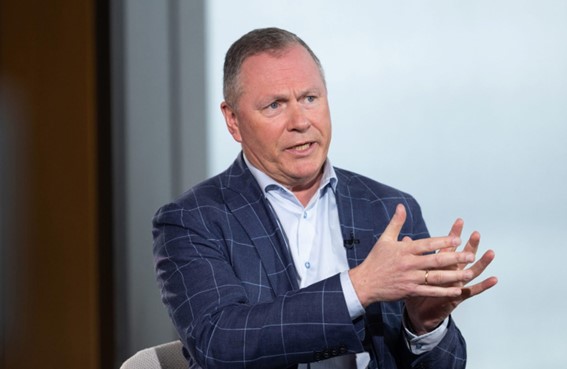
这位挪威的“亿万富翁”认为,美国人对待失败的态度有助于推动美国领先于欧洲同行——欧洲员工可能更好地实现工作与生活的平衡,但却没有那么雄心勃勃。
尼古拉·坦根领导着北欧巨头挪威银行投资管理公司,该公司负责管理挪威石油和天然气资源的收入,旨在确保其收益在挪威当代和子孙后代之间实现公平分配。
自2020年以来,在坦根的领导下,在过去的十年里,这只1.6万亿美元的基金日益增加在美国的投资股份,而不是它的近邻欧洲——这并非巧合。
坦根向英国《金融时报》表示,与欧洲相比,美国的表现,尤其是在创新方面,超越了欧洲竞争对手,欧洲的落后令人担忧。
坦根补充说,部分原因在于心态,以及各大洲对错误和风险的接受程度:“你在美国破产了,还会有另一个机会。在欧洲,你就无法起死回生了。”
但问题远不止于此——他补充道,两国在“总体野心水平”上存在差异。坦根继续说道:“我们不是很有野心。我在谈论工作与生活的平衡时很谨慎,但美国人工作更努力。”
数据表明,坦根是对的,但只是略微偏颇。根据欧盟的数据,2022年,22岁至65岁人群的平均每周工作时间为37.5小时。希腊的每周工作时间最长,为41小时,波兰为40.4小时。相比之下,荷兰的每周工作时间最短,为33.2小时,其次是德国,为35.3小时。
与此同时,国际劳工组织(International Labour Organization)1月份最新的数据显示,美国员工平均每周工作时间为38小时。然而,在这些员工中,13%的人每周工作49小时或更长时间,超过了大多数欧洲国家。
此外,像英国这样的国家有一项法定要求,即如果你是全职员工,每年有权享受28天的带薪假期。在美国,法律并没有规定员工享有带薪假期,但根据美国劳工统计局(Bureau of Labor Statistics)的数据,每位员工工作第一年平均享有8天的带薪假期。
尽管钦佩美国员工的职业道德,但坦根明确表示,他并不认同公司高管获得的极端薪酬待遇。去年,他在接受《财富》杂志采访时表示,年收入超过2000万美元的首席执行官们是在“替我们致富”。
“这就像明抢。”他补充说。
挪威银行的投资策略无疑是向美国的趋势倾斜的:毕竟,美国是美股七巨头(Magnificent Seven,即Meta、苹果、亚马逊、谷歌、微软、特斯拉及英伟达)的所在地,它们为股市繁荣起到了支撑作用,而且据分析师称,这种情况还将持续下去。
挪威银行投资管理公司等机构的支持将鼓励其他投资者加入进来。该集团是全球最强大的金融工具之一:它是全球股市最大的单一所有者,控制着全球上市公司1.5%的股份。
该集团还拥有大量高端地产,包括伦敦摄政街25%的股权,以及纽约时代广场和华盛顿特区宾夕法尼亚大道写字楼约50%的股权。
目前,对美国的投资占挪威银行投资组合的46.9%,而10年前,这一比例还不到30%。再往前追溯10年,即2003年,该机构在美国的投资仅占总投资的26.3%。
相反,2003年,挪威银行投资组合中59.5%投资于欧洲国家,而到2023年,这一数字已降至28.7%。
选举问题
当然,与许多美国投资者一样,坦根也在密切关注2024年的美国总统大选,因为这可能会动摇投资方向。
作为一名年薪不到100万美元的公务员,这位首席执行官表示,公司内部有人对即将到来的大选感到担忧,但他补充说:“我可能不应该对此说太多。我们长期投资于美国优秀的企业,(大选结果)不会对我们配置资本的方式产生任何影响。我们几乎一半的资产都是美国企业,(今后)将继续投资美国。”
根据英国《金融时报》的报道,美股七巨头的股票占挪威银行所持股票的12%,坦根补充说,“有理由认为,大者愈大,[和]赢者通吃。”
当然,美股七巨头还有一个共同点,那就是人工智能,这也是华尔街目前最青睐的一个词语。
坦根说,在这一领域,欧洲给自己制造了障碍。他说,与美国相比,欧洲的繁文缛节太多,这让科技公司的首席执行官们感到沮丧。
不可否认,即使是那些在美国人工智能领域处于领先地位的人也在要求设置护栏——询问一下OpenAI的山姆·奥特曼(Sam Altman)和特斯拉(Tesla)的首席执行官埃隆·马斯克(Elon Musk)就知道了。
坦根补充道:“我不是说这是好事。在美国,有很多人工智能应用,却没有提出监管措施;而在欧洲,没有人工智能应用,却提出大量监管措施。这很耐人寻味。”(财富中文网)
译者:中慧言-王芳
这位挪威的“亿万富翁”认为,美国人对待失败的态度有助于推动美国领先于欧洲同行——欧洲员工可能更好地实现工作与生活的平衡,但却没有那么雄心勃勃。
尼古拉·坦根领导着北欧巨头挪威银行投资管理公司,该公司负责管理挪威石油和天然气资源的收入,旨在确保其收益在挪威当代和子孙后代之间实现公平分配。
自2020年以来,在坦根的领导下,在过去的十年里,这只1.6万亿美元的基金日益增加在美国的投资股份,而不是它的近邻欧洲——这并非巧合。
坦根向英国《金融时报》表示,与欧洲相比,美国的表现,尤其是在创新方面,超越了欧洲竞争对手,欧洲的落后令人担忧。
坦根补充说,部分原因在于心态,以及各大洲对错误和风险的接受程度:“你在美国破产了,还会有另一个机会。在欧洲,你就无法起死回生了。”
但问题远不止于此——他补充道,两国在“总体野心水平”上存在差异。坦根继续说道:“我们不是很有野心。我在谈论工作与生活的平衡时很谨慎,但美国人工作更努力。”
数据表明,坦根是对的,但只是略微偏颇。根据欧盟的数据,2022年,22岁至65岁人群的平均每周工作时间为37.5小时。希腊的每周工作时间最长,为41小时,波兰为40.4小时。相比之下,荷兰的每周工作时间最短,为33.2小时,其次是德国,为35.3小时。
与此同时,国际劳工组织(International Labour Organization)1月份最新的数据显示,美国员工平均每周工作时间为38小时。然而,在这些员工中,13%的人每周工作49小时或更长时间,超过了大多数欧洲国家。
此外,像英国这样的国家有一项法定要求,即如果你是全职员工,每年有权享受28天的带薪假期。在美国,法律并没有规定员工享有带薪假期,但根据美国劳工统计局(Bureau of Labor Statistics)的数据,每位员工工作第一年平均享有8天的带薪假期。
尽管钦佩美国员工的职业道德,但坦根明确表示,他并不认同公司高管获得的极端薪酬待遇。去年,他在接受《财富》杂志采访时表示,年收入超过2000万美元的首席执行官们是在“替我们致富”。
“这就像明抢。”他补充说。
挪威银行的投资策略无疑是向美国的趋势倾斜的:毕竟,美国是美股七巨头(Magnificent Seven,即Meta、苹果、亚马逊、谷歌、微软、特斯拉及英伟达)的所在地,它们为股市繁荣起到了支撑作用,而且据分析师称,这种情况还将持续下去。
挪威银行投资管理公司等机构的支持将鼓励其他投资者加入进来。该集团是全球最强大的金融工具之一:它是全球股市最大的单一所有者,控制着全球上市公司1.5%的股份。
该集团还拥有大量高端地产,包括伦敦摄政街25%的股权,以及纽约时代广场和华盛顿特区宾夕法尼亚大道写字楼约50%的股权。
目前,对美国的投资占挪威银行投资组合的46.9%,而10年前,这一比例还不到30%。再往前追溯10年,即2003年,该机构在美国的投资仅占总投资的26.3%。
相反,2003年,挪威银行投资组合中59.5%投资于欧洲国家,而到2023年,这一数字已降至28.7%。
选举问题
当然,与许多美国投资者一样,坦根也在密切关注2024年的美国总统大选,因为这可能会动摇投资方向。
作为一名年薪不到100万美元的公务员,这位首席执行官表示,公司内部有人对即将到来的大选感到担忧,但他补充说:“我可能不应该对此说太多。我们长期投资于美国优秀的企业,(大选结果)不会对我们配置资本的方式产生任何影响。我们几乎一半的资产都是美国企业,(今后)将继续投资美国。”
根据英国《金融时报》的报道,美股七巨头的股票占挪威银行所持股票的12%,坦根补充说,“有理由认为,大者愈大,[和]赢者通吃。”
当然,美股七巨头还有一个共同点,那就是人工智能,这也是华尔街目前最青睐的一个词语。
坦根说,在这一领域,欧洲给自己制造了障碍。他说,与美国相比,欧洲的繁文缛节太多,这让科技公司的首席执行官们感到沮丧。
不可否认,即使是那些在美国人工智能领域处于领先地位的人也在要求设置护栏——询问一下OpenAI的山姆·奥特曼(Sam Altman)和特斯拉(Tesla)的首席执行官埃隆·马斯克(Elon Musk)就知道了。
坦根补充道:“我不是说这是好事。在美国,有很多人工智能应用,却没有提出监管措施;而在欧洲,没有人工智能应用,却提出大量监管措施。这很耐人寻味。”(财富中文网)
译者:中慧言-王芳
Norway’s “trillion-dollar man” believes America’s attitude toward failure is helping propel the nation ahead of its European counterparts—where workers may have a better work-life balance but aren’t as ambitious.
Nicolai Tangen leads Nordic behemoth Norges Bank Investment Management, which governs the revenue earned by Norway’s oil and gas resources, with the aim of ensuring its benefits are distributed fairly between current and future Norwegian generations.
Under Tangen’s leadership since 2020, and over the past decade, the $1.6 trillion fund has invested more and more heavily in the U.S. instead of its closer neighbors in Europe—and it’s no coincidence.
America’s performance, particularly in innovation, is “worrisome” in contrast to Europe, Tangen told the Financial Times.
Part of comes down to mindset, Tangen added, and how accepting each continent is of mistakes and risk: “You go bust in America, you get another chance. In Europe, you’re dead,” he said.
But it goes deeper than that—there’s a difference in the “general level of ambition,” he added. “We are not very ambitious. I should be careful about talking about work-life balance, but the Americans just work harder,” Tangen continued.
Data suggests that Tangen is right—but only by a fine margin. According to the European Union, in 2022 the average workweek of people between the ages of 22 and 65 was 37.5 hours. The longest working weeks recorded were in Greece—41 hours a week—and Poland—40.4 hours. By contrast, the Netherlands had the shortest working week of 33.2 hours, followed by Germany at 35.3 hours.
Meanwhile, data from the International Labour Organization, last updated in January, showed the average hours workers clocked in the U.S. was 38 hours a week. However, of those employees, 13% worked 49 hours or more per week, which outstripped the majority of European nations.
Moreover, countries like the U.K. have a statutory requirement entitling staff to 28 paid days of leave a year—if you’re a full-time employee. In the U.S. it is not a legal requirement for staff to be given any paid time off; however, according to the Bureau of Labor Statistics, the average employee who is in their first year of service takes eight PTO days.
Despite admiring the work ethic of staffers in the U.S., Tangen has made it clear he doesn’t agree with the extreme pay packages handed to execs. Last year he told Fortune that CEOs who earn more than, say, $20 million a year, are “enriching themselves on our behalf.”
“It’s like daylight robbery,” he added.
Norges Bank’s investment strategy has certainly leaned into the U.S. trend: After all, America is home to the Magnificent Seven, which have provided a backbone to the stock market boom and, according to analysts, will continue to do so.
And the backing of an institution like Norges Bank Investment Management will encourage other investors to jump on board. The group is one of the most powerful financial vehicles on the planet: It is the world’s largest single owner of global stock markets, controlling 1.5% of shares in the world’s listed companies.
The organization also owns swaths of high-end property, including a 25% stake in London’s Regent Street and an approximately 50% holding in offices in New York’s Times Square and on Washington’s Pennsylvania Avenue.
Investments in the U.S. now represent 46.9% of Norges Bank’s portfolio, whereas a decade ago the U.S. represented just under 30%. Going back a further 10 years, in 2003, the organization’s investment in America made up just 26.3% of all investments.
Conversely, in 2003, 59.5% of Norges Bank’s portfolio was invested in European countries, a figure that, by 2023, had fallen to 28.7%.
The election issue
Of course, like many American investors, Tangen is closely watching the 2024 presidential elections, which could rock the investing boat.
The CEO, who as a public servant earns less than $1 million a year, said there were people within the organization who were concerned about the upcoming race, but added: “I probably shouldn’t say too much about that. We just invest in America in great companies for the long term. It won’t have any implications for how we allocate our capital. We have nearly half the assets in America; we will stay invested in America.”
Per the FT, Magnificent Seven stocks make up 12% of Norges Bank’s equity holdings, with Tangen adding, there’s “an argument for the big getting bigger, [and] the winner taking it all.”
There is, of course, a common thread among all the Magnificent Seven businesses—and it’s the current favorite phrase of Wall Street: artificial intelligence.
Again, this is an area where, Tangen said, Europe was making life difficult for itself. Tech CEOs are frustrated, he said, by the amount of red tape in Europe compared with the U.S.
Admittedly, even those who are leading the way with AI in the U.S. are asking for guardrails—just ask OpenAI’s Sam Altman and Tesla CEO Elon Musk.
“I’m not saying it’s good, but in America you have a lot of AI and no regulation; in Europe you have no AI and a lot of regulation. It’s interesting,” Tangen added.






